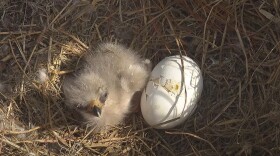ANDREA SEABROOK, host:
And now to Moscow where President Vladimir Putin's United Russia Party has apparently won the big victory it was expecting in today's parliamentary vote. Early results give United Russia about 63 percent.
Here in Washington, the White House urged Russian authorities to investigate charges of election-day violations.
I spoke with NPR's Gregory Feifer in Moscow earlier today, and I asked about the turnout.
GREGORY FEIFER: Well, it was a very cold day. It was well below freezing and snowing, and still the turnout was quite high. The Central Elections Commission says it expects about 60 percent of the electorate will vote in these elections, which is up from 56 percent, I think, four years ago.
There was a feeling of inevitability at the polling stations. The people I spoke to, who had said they had voted for the pro-Putin United Russia Party, seemed assured that their party would win. The only opposition party that will likely make it into the parliament is the Communist Party. All the other parties that have a chance of making it in are pro-Kremlin parties.
SEABROOK: Greg, talk about some of those intimidation tactics United Russia was using.
FEIFER: In today's voting, opposition parties have said that they have registered a large amount of voting irregularities. Actually I saw this myself in polling stations that voting booths were open. People marking their ballots were visible to anybody around. And the opposition was saying that this was a form of intimidation. There are lot of reports of government employees saying that officials were forcing them to vote for the United Russia Party.
Now one of those who were complaining about this was opposition leader Garry Kasparov, who was just arrested for five days very recently. He was complaining, after he voted in Central Moscow today. And this is what he had to say.
Mr. GARRY KASPAROV (Political Activist, Russian Presidential Candidate): We already found enough evidence about the massive fraud prepared by United Russia. Our activists, they were told that literally, Putin's supporters can vote as many times as they can during the day.
FEIFER: And two opposition parties, the Communist Party and the Liberal Union of Right Forces Party, say they are going to challenge the votes in the courts.
SEABROOK: Greg, we keep hearing that with oil prices high and the economy improving, Russians are happy with President Putin. So why would the Kremlin resort to these pressure tactics, intimidation tactics?
FEIFER: I don't think there's any one answer. It's genuinely a mystery. This is a vote about President Putin; it's not really about the elections. United Russia's expected victory say President Putin's supporters gives him the moral right to serve as Russia's national leader after his presidential term expires next March.
President Putin views this vote as a mandate about his eight years in office. And the bigger the victory, the more options he has to, essentially, choose to do whatever he wants next year when his term limit expires. The fact is that Putin alone controls Russian politics.
A commentator recently said all of Russian politics takes place inside Vladimir Putin's head. Everything else is irrelevant.
SEABROOK: NPR's Gregory Feifer in Moscow. Thank you very much.
FEIFER: You're welcome. Transcript provided by NPR, Copyright NPR.
NPR transcripts are created on a rush deadline by an NPR contractor. This text may not be in its final form and may be updated or revised in the future. Accuracy and availability may vary. The authoritative record of NPR’s programming is the audio record.









